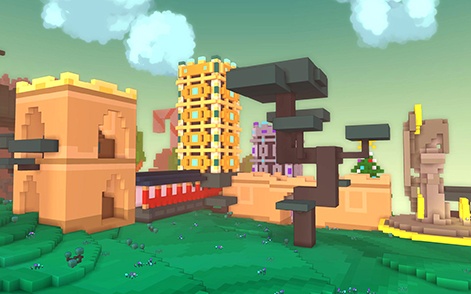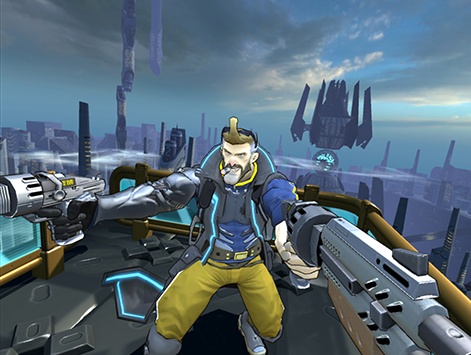The last few years have seen Trion Worlds change a great deal.
Back in 2013, the firm had just two games in the wild, Rift and Defiance. Now, the firm boasts four of its own projects, plus two partner games, and a wealth of internal prototyping for the next game.
“When you look at around what's going on at the office today, we have a couple of different prototypes in development for what our next games are going to be,” CEO Scott Hartsman says.
“We're always evaluating outside partnership games to publish and we have three evaluations in progress right now. It's a promising time.”
In terms of partner games, Hartsman says that the process for finding projects to work with comes down to a very simple test.
“We look for a couple of different things. For starters, when we do playtests, we want to make sure that the people at the company are having fun with the game,” he explains.
“That's the first test for us - whether we're enjoying it. We think we can do a better job with games we can really get into. If we can get into it, we can understand them better. We do that first. Then what we tend to look for is developers who we have some complementary ability with. For instance, one of the studios we're talking with right now is a moderate-sized publisher that we don't publish in. We don't do a lot of Asia, so we have a lot of complementary abilities where we do the customer service, localisation, hosting, community management - we can be their developer's proxy to our customers. We look for people we have really strong complementary fits with. Then we also look for small and innovative teams to work with; people we feel we can help in ways they can't help themselves.”

Back in 2015, Trion released a sandbox MMO called Trove. In March of this year, the company launched the game into a closed beta in China which has thrown up some interesting feedback that has been implemented into the game across the world.
“There's a bunch of new game features that deal with advancement and depth of classes,” Hartsman says.
“The classes in Trove have always been intentionally easy to pick up and play. We added another layer of depth called subclasses to them which the China market wanted as well. We added a bunch of great new features that the Western market wanted to. So a lot of it has just been the extra development time for these features.”
Having spoken to a number of people about the Chinese games market, one of the reasons that success for Western companies in this region has been hard is due to the fact these firms aren’t making games with Chinese people in mind; they are Western titles. So is Trion interested in making a game specifically for the Chinese market?
“We've thought about it,” Hartsman admits.
“We don't really think about things in terms of China specifically. What we have done very consciously, and we're doing this with some of our prototypes right now, is trying to swing a little bit from the super Western art appearance to something we consider to have more global appeal. There are certain styles out there, at least visually. The vast majority of gamers are very visual people when it comes to games they're playing. If you use Rift as an example; hardcore, hardcore Western art does not have a whole lot of Eastern appeal. Meanwhile, you can see certain Eastern games that come West really well visually. You can also see some Western games that do crossover. We don't see about aiming games towards China specifically, but we do think about trying to make things that could succeed just as well in both places.”
Few people in the games market are as qualified to talk about the MMO space as Trion and Hartsman; these projects have more or less been the company’s focus for its entire existence. Right now, Hartsman says that there is new life in the sector.
“I'm very excited by the number of teams that are out there doing cool stuff, whether they're using their own tech or whether they're using something like Improbable’s,” he says.
“But one thing that's absolutely undeniable is the power of what Unity and Unreal have done for everybody; MMO and other games. Now, Amazon is coming on the scene with Lumberyard. The fact that these engines exist as a base for everybody has been a massive force multiplier. When I was launching Everquest 2, we were making fun of the state of technology at the time and were trying to explain it to other people inside Sony; imagine that every time you had to make a new movie, you had to rebuild your cameras from scratch, you had to invent new film. There's so much plumbing and so many fundamentals that you have to rebuild just to make a new game. It was only available to people that were 100 people teams. These days, even Trion is able to get games off the ground. Our smallest game team, at the time of its launch, was about 11 people; that was Trove. A lot of that was building on what we had learnt from our previous games and reusing as much of our backend as we possibly could. Now, these days, you have people reusing more and more what's becoming essentially commodity technology. It's great.”

Trion has also dipped its feet into the burgeoning esports market with its title Atlas Reactor. The company was running tournaments with cash prizes when the project was just in beta. The idea that pro-gaming might be a bubble has been floating around the games scene for a while; that people are pumping millions into the sector but not seeing much of a return. Hartsman says this might be a danger for people who don’t have realistic expectations.
“It's fortunately not that big of a concern for us because we don't have big, overblown expectations of what we are getting out of it,” he explains.
“I agree that there are definitely some people that are going to be over-investing in this space. When you hear stories of people paying $20m for a franchise license for a game; those are big, scary numbers. There's a lot that those games need to live up to. But that's the thing - you're not going to see multiple games commanding that type of money, but then they're also not going to be backed by the whole power of Activision or King or Valve. There are certain people who have achieved certain levels of scale to where that actually that does stand a chance of paying off. But I would not recommend that for everybody.”
Looking to the coming year, Hartsman has some pretty lofty plans.
“The ideal conversation, from my point of view for us to be having a year from now, would be where I give you the exclusive on the announcement of our new game which will have been through it's own internal multiple prototypes rounds and will be sailing on into full production,” he says.
“We will have signed at least one new gaming partnership and I will have one new outbound partnership because we also take our games and work with partners in other regions that we don't service directly. All of those are very likely to be occurring. “
















